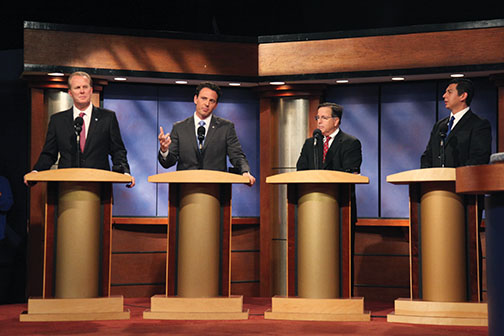One of the first major debates leading up to the Nov. 19 special mayoral election took place between the four frontrunners at KPBS studio on Monday. The debate was organized as a partnership between San Diego State’s School of Public Affairs, KPBS and 10News.
City councilmen Kevin Faulconer and David Alvarez, former state assemblyman and Qualcomm Inc. Senior Director Nathan Fletcher and former San Diego City Attorney Mike Aguirre fielded variety of questions from the moderators, the crowd and one another about topics ranging from medical marijuana usage to street repair.
Alvarez, Fletcher and Aguirre are all Democrats, which Aguirre said was one of the challenges of the debate.
“You have to stick to the things that make you different from your colleagues,” Aguirre said before the debate. “Walking the party line won’t cut it here.”
Aguirre’s main talking point for the debate was his proposed plan for citywide pension reform. Fletcher, who was championing an ambitious plan to add 130,000 jobs in San Diego by 2020, poked fun at Aguirre’s strict adherence to the time constraints imposed during the debate.
Alvarez and Faulconer, who are the officially endorsed candidates of the Democratic and Republican parties, respectively, took on a less drastic approach to the debate, by walking closer to their parties’ platforms.
Alvarez focused on a neighborhood-based strategy of evaluating San Diego’s needs, while Faulconer emphasized the need to undo Filner’s actions during his short stint in office.
Fletcher, who has been a favorite in recent polls, was one of the main targets during the debate as each of the other candidates attacked his political history and relative lack of experience.
Despite the friendly competition between the candidates, they generally agreed on most of the issues discussed, with the main differences being in how they proposed to deal with or fund problematic areas.
Every candidate discussed the need for extensive repairs to the city’s streets and an increase in law enforcement. They even agreed on medical marijuana legality.
The candidates seemed to be in relatively high spirits as they left the studio after the debate. The lack of a clear winner left them optimistic about the final stretch of the short special election campaign, Aguirre said.
“I think now that people have a chance to get to know us candidates, I think that helps some of us more than others,” Aguirre said as Fletcher walked by.
Director of the School of Public Affairs Stuart Henry said the debate was something to look forward to, since the candidates want to make a real impact on the city in the wake of former mayor Bob Filner’s scandal.
“We’re quite excited that this time, we got real candidates who genuinely want to make a difference to the city of San Diego,” Henry said. “So here we are with the four candidates running, each with interesting credentials, and what we hope to get out of it is that we hope to elevate the level of governance because what’s been happening lately is that it’s been trivialized by this unethical and really misdirected form of non-government.”
Henry said the debate was organized in an attempt to re-emphasize the substance of government without having to worry about the ethics of those in charge.
“One of things we emphasize as a school is that it’s not enough to have ethical values, you have to have ethical practices,” Henry said. “You have to implement ethics on a daily basis. We want to see elected officials in a serious political debate that raises the level and the quality of the political process such that we are no longer side-tracked, but we are dealing ethically with leadership.”
Photo by Monica Linzmeier, photo editor







